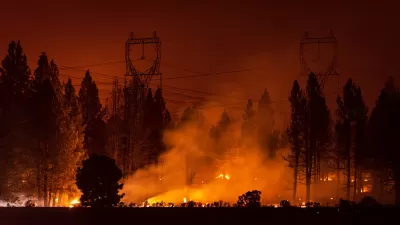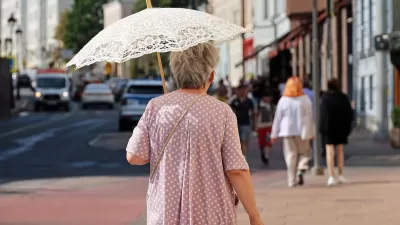The state has the most heat-related hospital visits in the nation, but efforts to create protections for outdoor workers and other vulnerable residents have been stymied by state legislators.

Florida is seeing the highest number of heat-related illnesses in the country, reveals a new report from the Florida Policy Institute.
As Ashley Miznazi explains in Governing, “The state saw more than 26,000 emergency room visits and 5,000 hospitalizations for heat-related illness between 2018 and 2022, according to the most recent U.S. Centers for Disease Control data compiled by the Orlando-based institute, a non-profit organization that researches health, education and other policy issues.” In a similar period (2017 to 2021), roughly 150 people died of heat-related causes in the state.
An accurate count of heat-related deaths is not always available, “with heat’s impact watered down in official statistics,” Mizrazi notes. “For example, when someone is hospitalized for a condition worsened by heat, their provider typically records only the chronic illness as a cause. The new report also highlights that some Floridians, such as outdoor workers who may fear retaliation from employers for reporting an incident, are also excluded from national statistics.”
With extreme heat expected to become a more widespread problem, understanding heat deaths and who is at risk is a crucial public health issue. Yet in Florida, state lawmakers recently passed a law blocking local governments from enforcing any heat-related protections for workers.
In addition to the half million outdoor workers in the state, the report notes that over 5.7 million Florida residents are “socially vulnerable” to heat due to disability, a lack of health insurance, and a lack of cooling in their homes.
FULL STORY: Florida Has the Most Heat-Related Illnesses in the U.S.

Planetizen Federal Action Tracker
A weekly monitor of how Trump’s orders and actions are impacting planners and planning in America.

Congressman Proposes Bill to Rename DC Metro “Trump Train”
The Make Autorail Great Again Act would withhold federal funding to the system until the Washington Metropolitan Area Transit Authority (WMATA), rebrands as the Washington Metropolitan Authority for Greater Access (WMAGA).

The Simple Legislative Tool Transforming Vacant Downtowns
In California, Michigan and Georgia, an easy win is bringing dollars — and delight — back to city centers.

The States Losing Rural Delivery Rooms at an Alarming Pace
In some states, as few as 9% of rural hospitals still deliver babies. As a result, rising pre-term births, no adequate pre-term care and harrowing close calls are a growing reality.

The Small South Asian Republic Going all in on EVs
Thanks to one simple policy change less than five years ago, 65% of new cars in this Himalayan country are now electric.

DC Backpedals on Bike Lane Protection, Swaps Barriers for Paint
Citing aesthetic concerns, the city is removing the concrete barriers and flexposts that once separated Arizona Avenue cyclists from motor vehicles.
Urban Design for Planners 1: Software Tools
This six-course series explores essential urban design concepts using open source software and equips planners with the tools they need to participate fully in the urban design process.
Planning for Universal Design
Learn the tools for implementing Universal Design in planning regulations.
Smith Gee Studio
City of Charlotte
City of Camden Redevelopment Agency
City of Astoria
Transportation Research & Education Center (TREC) at Portland State University
US High Speed Rail Association
City of Camden Redevelopment Agency
Municipality of Princeton (NJ)





























